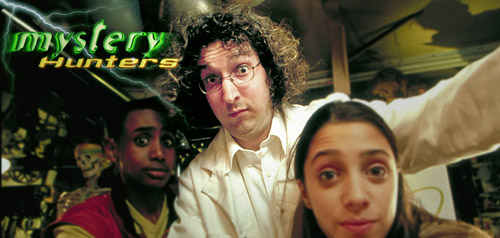


Doubting Dave!
Can a kids’ science and critical thinking television program be both entertaining and informative? The award-winning Mystery Hunters, beginning its fourth season, is proving that it can. On this week’s Skepticality, Swoopy talks with David Acer — known to fans of Mystery Hunters as “Doubting Dave,” the skeptical scientist who helps the junior members of his team (Araya Mengesha and Christina Broccolini) investigate paranormal mysteries.
David is a close up magician, comedian, and actor and writer for children’s educational programs including Popular Mechanics for Kids and Prank Patrol. David shares his thoughts about how to make debunking myths entertaining, and explains why it’s difficult to get quality kids’ science programs on TV in today’s climate.
Items of Interest
In this week’s eSkeptic, we present Michael Shermer’s Los Angeles Times opinion editorial on Scientology, followed by several Letters to the Editor that ran in response. And then, we present, in part, Jean E. Rosenfeld’s Los Angeles Times op-ed rebuttal to Michael’s piece.

Scientology, Anonymous
an LA Times op-ed by Michael Shermer
Imagine reading the following press release:
Hello, Jews. We are anonymous. Over the years, we have been watching you. Your campaigns of misinformation; suppression of dissent; your litigious nature, all of these things have caught our eye … Anonymous has therefore decided that your organization should be destroyed. For the good of your followers, for the good of mankind — for the laughs — we shall expel you … and systematically dismantle Judaism in its present form…
The rantings of crazed neo-Nazis, right? No. Substitute “Jews” and “Judaism” with “Scientologists” and “Church of Scientology” and you are reading from a statement issued by a group of anti-Scientologists calling themselves “Anonymous.” This statement was released Jan. 21 (read in a YouTube video by a Stephen Hawking-like computerized voice). It was followed by another on Sunday Feb. 10 that coincided with demonstrations at Scientology centers around the world at which protesters donned masks (the Guy Fawkes variety from the movie “V for Vendetta”) and waved posters that read, among other things, “Honk if you hate Scientology.”
Again, imagine if that sign read “Honk if you hate Jews.” How innocuous would such a protest be in that case?
And yet this latest turn against the organization founded in 1954 by science fiction writer L. Ron Hubbard has an air of farcical comedy to it. Why? Why aren’t civil-rights organizations and antihate-speech activists pouncing on these protesters? The reason, I suspect, is that most of us do not consider Scientology a religion, at least not a religion that resembles in the slightest the world’s major faiths.
One clue to this interpretation can be seen in other protesters’ signs: “Religion is Free, Scientology is Not” and “Trade Secrets are for Business, Not Religion.” I’m a scientist who studies belief systems for a living, so take it from me: Scientology is unlike any other religion in history. Although the Church of Scientology is recognized by the IRS as a tax-exempt religion (despite years of litigation by the IRS to collect taxes on its income), no other religion I know of considers theological doctrines and core religious tenets to be intellectual property accessible only for a fee.
Envision converting to Judaism but having to pay to learn the story of Abraham and Isaac, Noah and the flood, or Moses and the Ten Commandments. Or imagine joining the Catholic Church but not being told about the crucifixion and the resurrection until you have reached Operating Theological Level III, which takes many years and many tens of thousands of dollars.
That is, in essence, how the Church of Scientology dispenses its theology, leading ex-members, critics and journalists to divulge Scientology’s sacred myth all over the internet, and in such national publications as the New York Times and Rolling Stone magazine, and even on the animated TV series “South Park.” The story centers on Xenu the galactic warlord, who 75 million years ago was in charge of 76 overpopulated planets. Xenu brought trillions of these alien beings to Earth (called Teegeeack) on spaceships that resembled DC-9 planes, and placed them in select volcanoes. He then vaporized them with hydrogen bombs, scattering to the winds their souls, called thetans, which were then rounded up in electronic traps and implanted with false ideas. These corrupted thetans attach themselves to people today, leading to drug and alcohol abuse, addiction, depression and other psychological and social ailments that only Scientology classes and “auditing” employing “e-meters” can cure. Paying customers, by the way, do not get to hear this story until they reach Operating Thetan Level III.
This peculiar story helps explain, in part, the often inexplicable Tom Cruise, whom we’ve all seen renouncing the evils of psychiatry and the drug industry on the “Today” show and more recently in a viral YouTube video. There’s nothing wrong with being skeptical of psychiatry — I publish Skeptic magazine, which recently included an article by a psychiatrist who took his colleagues to task for overmedication and for overlabeling as diseases what may just be unusual behavior. As well, self-help gurus such as Anthony Robbins have developed techniques that may very well surpass psychiatry in helping people. But psychiatrists, drug companies and motivational speakers pay taxes on their products and services; they do not masquerade as religious leaders. This is yet another aspect of Scientology that provokes the type of animosity we are seeing in these recent attacks.
Humans are by nature tribal and xenophobic. We evolved a natural tendency to look askance at those who are different from us, and especially to be suspicious of activities beyond our purview. Transparency and fairness are the key to trust, and trust is the social glue that binds a diverse society such as ours. This is why we insist on so many checks and balances in government, so many rules and regulations in markets, and equal treatment under the law.
The reason people are suspicious of Scientology is because of its cult-like secrecy, its overly aggressive response to and legal attacks against critics, and especially the hypocrisy of comporting itself as a faux religion in a society willing to reward corporate success but not religious greed.
Letters to the Editor
When I was 17, I left the Church of Scientology. When I was 22, my parents and all members of my immediate family were pressured by the church to “disconnect” from me. When I heard of the protests by Anonymous on behalf of all those who have lost their families, homes and savings accounts to Scientology, I thanked God that someone was finally willing to listen. Reading Michael Shermer’s op-ed article, I was surprised to find myself frustrated and misty-eyed. Why is it that journalists repeatedly and insistently focus on the sensationalist aspect of the Xenu story when reporting about Scientology, ignoring child labor, physical assault, psychological abuse and other travesties that go on every day behind those walls?
Shermer says that the recent protest of Scientology by the group calling itself Anonymous had the air of a comical farce. He’s dead on there, but other than that, his reasoning is dead wrong. How can a man of science who studies belief systems for a living make evaluations about a religion he hasn’t studied? The basic books and lectures on which the religion is based are available to anyone who cares to read and listen to them. These books and lectures can be purchased not only in Scientology churches but in bookstores and over the Web, and they are available for borrowing in libraries all over the world. I highly recommend that he take the time to read up on his subject before he makes a farce of himself again.
I appreciated Shermer’s article. It provided an objective view on the criticism of the Church of Scientology. As an avid fan of science fiction, I have to admit that I enjoyed L. Ron Hubbard’s novel, Battlefield Earth. Nevertheless, I consider the church to fall into the same category — space opera. Many countries do not consider the church a tax-exempt religious organization. Furthermore, some in the German government consider this faux religion an example of evil totalitarianism. I trust their judgment when it comes to determining that. Criticism and hatred of the church is nothing new. But if it will voluntarily start to treat itself as a financially transparent (and legally responsible) for-profit organization, then it nevertheless deserves the right to exist.
Shermer argues that because Scientology is a new religion, its members are not entitled to the rights afforded other religions, and that different beliefs justify the hate crimes of the cyber-terrorist group Anonymous. Every new religion has had to fight ignorance and intolerance, and Scientology is no exception. The allegations raised by Shermer have long since been disproved and the church vindicated. In the U.S., documents obtained under the Freedom of Information Act showed these charges to be false, leading the Internal Revenue Service to recognize all churches of Scientology as tax-exempt. After years of discrimination in Australia, the Charity Commission uses Scientology as the benchmark for the definition of religion. Italy’s Supreme Court found that Scientology’s fundraising system is fairer than that of the Catholic Church. In little more than half a century, Scientology has been acknowledged as a religion by courts, government agencies and religious scholars the world over. No matter one’s personal beliefs, hate crimes should never be condoned against any religion.
Scientology Stands a Chance
an LA Times op-ed rebuttal by Jean E. Rosenfeld
Skeptic Michael Shermer exposes hate speech against the Church of Scientology and strangely concludes that its “cult-like secrecy” and “hypocrisy” merit suspicion. He also calls it a “faux religion.”
Speaking as a scholar who has analyzed new religions for over 20 years, I deplore critics who pose as experts. Scientology is a new religion, and unlike most, it may become an established religion whether the rest of us like it or not.
All religions have origin myths, and all religions keep secrets from the uninitiated. If a nonbeliever were to tell the origin myth of Christianity, it would sound no less fantastic than the Thetan myth of L. Ron Hubbard: A spirit present as God before the creation of the universe splits off from Godhead after billions of years of Earth time and is born again as a flesh-and-blood person to a Jewish woman. The son gathers adherents, casts out demons from afflicted people, works miracles and finally confronts the evil king in the Jewish capital city. The evil empire’s soldiers try, convict and kill him in a public execution. He then is resurrected before his disciples and tells them to spread his kingdom throughout the world. He promises to appear again and save those who believe in his message and condemn to eternal punishment those who do not. All of his followers will be resurrected after our Earth is destroyed by seven years of heaven-sent catastrophes that kill off most of the human race…

Dr. Michio Kaku will be speaking on THURSDAY, March 27, 2008 at 7 pm
(NOTE the special date and time for this lecture).
the next lecture in our Spring season…
Physics of the Impossible
with Dr. Michio Kaku
SPECIAL EVENT DATE: Thursday, March 27, 2008 at 7 pm
Baxter Lecture Hall, Caltech
One hundred years ago, scientists would have said that lasers, televisions, and the atomic bomb were beyond the realm of physical possibility. In his new book, Physics of the Impossible, the renowned physicist Michio Kaku explores to what extent technologies and devices deemed equally impossible today might become commonplace in the future.… READ MORE about this lecture >
READ MORE about other upcoming lectures >
Important ticket information
Tickets are first come first served at the door. Sorry, no advance ticket sales. Seating is limited. $8 Skeptics Society members & Caltech/JPL Community; $10 General Public.

Every week, we’ll be adding new content to MichaelShermer.com and we’ll announce those additions here. You can also stay up-to-date by subscribing to the RSS feed.











